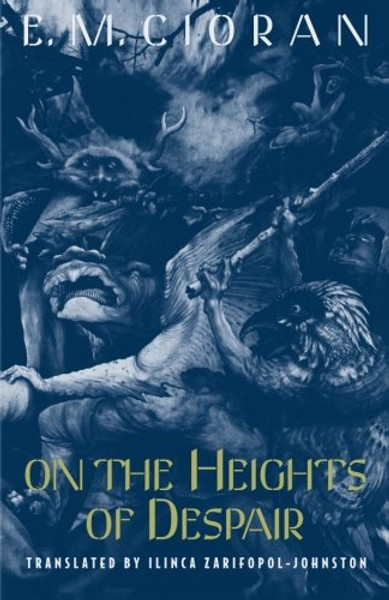Product Overview
Born of a terrible insomnia a dizzying lucidity which would turn evenparadise into hell this book presents the youthful Cioran, a self-described Nietzsche still complete with his Zarathustra, his poses, his mystical clown's tricks, a whole circus of the heights.
On the Heights of Despair shows Cioran's first grappling with themes he would return to in his mature works: despair and decay, absurdity and alienation, futility and the irrationality of existence. It also presents Cioran as a connoisseur of apocalypse, a theoretician of despair, for whom writing and philosophy both share the lyrical virtues that alone lead to a metaphysical revelation.
No modern writer twists the knife with Cioran's dexterity. . . . His writing . . . is informed with the bitterness of genuine compassion. Bill Marx, Boston Phoenix
The dark, existential despair of Romanian philosopher Cioran's short meditations is paradoxically bracing and life-affirming. . . . Puts him in the company of Nietzsche and Kierkegaard. Publishers Weekly, starred review
This is self-pity as epigram, the sort of dyspeptic pronouncement that gets most people kicked out of bed but that has kept Mr. Cioran going for the rest of his life. Judith Shulevitz, New York Times Book Review
On the Heights of Despair shows Cioran's first grappling with themes he would return to in his mature works: despair and decay, absurdity and alienation, futility and the irrationality of existence. It also presents Cioran as a connoisseur of apocalypse, a theoretician of despair, for whom writing and philosophy both share the lyrical virtues that alone lead to a metaphysical revelation.
No modern writer twists the knife with Cioran's dexterity. . . . His writing . . . is informed with the bitterness of genuine compassion. Bill Marx, Boston Phoenix
The dark, existential despair of Romanian philosopher Cioran's short meditations is paradoxically bracing and life-affirming. . . . Puts him in the company of Nietzsche and Kierkegaard. Publishers Weekly, starred review
This is self-pity as epigram, the sort of dyspeptic pronouncement that gets most people kicked out of bed but that has kept Mr. Cioran going for the rest of his life. Judith Shulevitz, New York Times Book Review








